Welcome
to the Epitaxial Materials Research group in the
University of North Carolina at Chapel Hill. Our research is focused in
exploring novel synthesis and properties of
magnetic epitaxial films and heterostructures using combinatorial MBE
techniques. It is aimed at developing deeper understanding of the
fundamental processes in these systems, and enhancing our ability to
tailor
materials and properties through atomic scale synthesis. Activities
include MBE synthesis and properties of complex alloys, epitaxial
growth mechanism, self-assembly of nanostructures, phase diagrams,
effects of epitaxial constraints, effects of dimensionality, and device
applications. This Combinatorial approach enables systematic
studies of the complex,
multi-component systems, including novel spin-polarized materials,
magnetic semiconductors, superconductors, and their heterostructures. A
variety of techniques are developed and employed to study these
phenomena, particularly those that are sensitive to local properties
and interactions including scanning probe microscopy/spectroscopy and
microprobe diffraction/spectroscopy. Students are trained in some of
the most technologically relevant techniques in synthesis and
characterization, including ultrahigh vacuum and cryogenics.
|
|
Recent
News
|
|
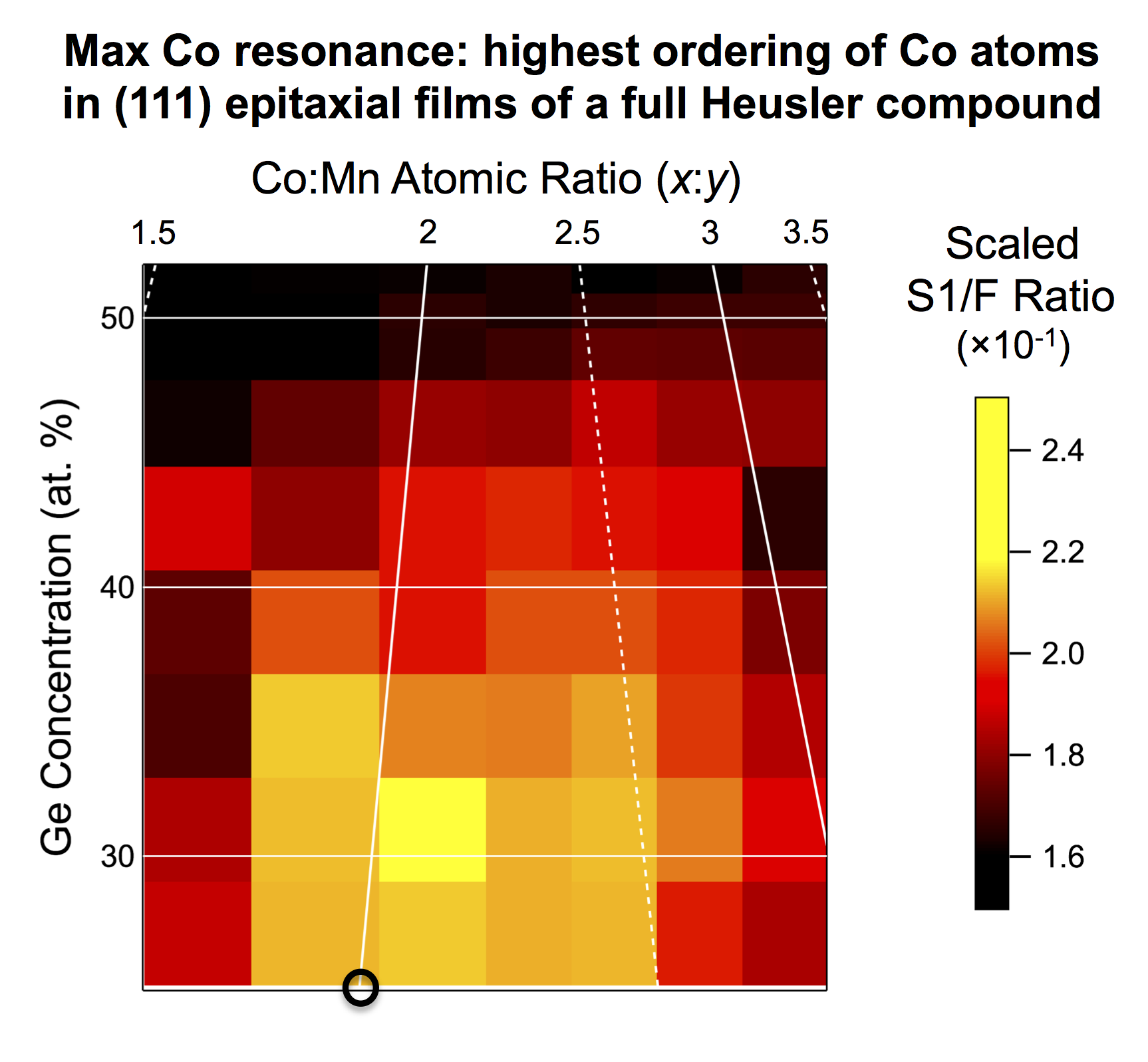
|
Feature Article in SPIE Newsroom on
New Anomalous Diffraction Technique
August 2017
Technical article featured in
SPIE Newsroom.org describing the development and application of a novel
multiple-edge anomalous x-ray diffraction (MEAD) technique to probe and
quantify lattice-site-specific elemental occupancy in nanoscale complex
alloys, including ultrathin epitaxial films of Heusler alloys. In the
figure, the highest degree of ordering (the yellow "hotspot") of Co
atoms in
the lattice of a full Heusler compound is identified (the circle at the
bottom indicates the composition of the stoichiometric compound Co2MnGe).
Link to the article here. |
|
|
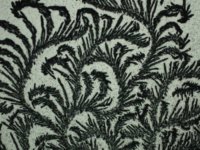
|
"Year
of the Dragon" Image of Valence
Tautomer Crystals Wins Award
May 2012
Will Rice won second place in the CHANL
Scientific Art Competition , together with collaborators Rob
Schmidt and
Robert
Bruce from UNC Chemistry, for his optical microscope image of
valence
tautomer crystals formed from a dichloromethane solution. In addition
to forming unique dragon-like crystal shapes, the
molecules also have interesting magnetotransport properties which the
group is exploring. Will
presented the results at the 2012 APS
March Meeting. Additional photos of the crystals are here. |
|
|
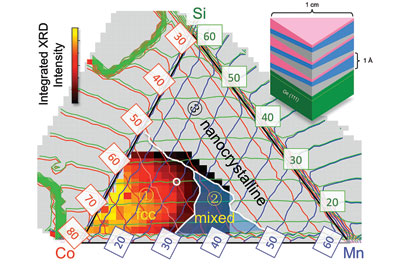
|
Recent Article Featured
on Journal Cover
May 2011
Article on combinatorial MBE growth
of Si Heusler alloys featured on the cover of May Issue of Journal of
Vacuum Science and Technology B. Here is the link
to the Issue. |
|
|

|
Combinatorial
Materials Science and
Technology Workshop
May 2010
The 6th International Workshop on Combinatorial Materials Science and
Technology will be held at the Rusutsu Resort on the island of
Hokkaido, Japan, October 26-29, 2010. For more information see the meeting
website. |
|
|
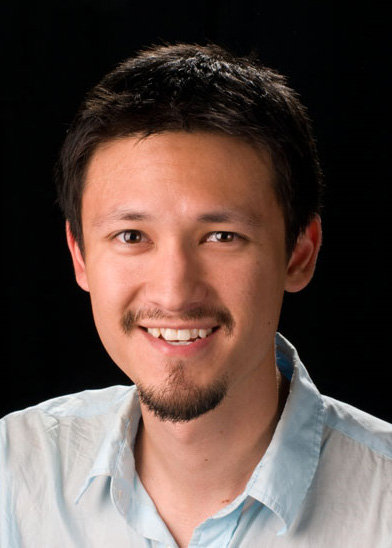 |
Brian Collins earns PhD
August 2009
Brian completed his dissertation on "Synchrotron x-ray studies
on structural and chemical ordering in group IV-based magnetic
epitaxial films" to earn his PhD. Congratulations, Brian! |
|
|
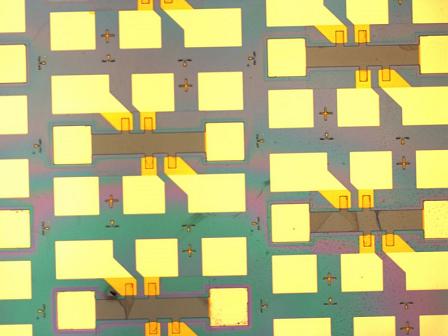 |
Alex Mellnik's honors
thesis receives highest honor
May 2009
Alex completed and defended his honors thesis entitled "Electric
field control of magnetism in magnetic semiconductors". The work
involved fabrication and magnetotransport measurements of Hall-geometry
gated
field effect structures. Congratulations!
|
|
|
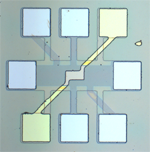 |
Alex Mellnik
wins Sheldon Award for Undergraduate Research
11 May 2008
Alex
Mellnik was
awarded the Sheldon Award for Undergraduate Research, which was
presented at the spring 2008 Physics department commencement ceremony.
This year's award was split between Alex and Johnathan Toledo, who
works with Professor Khveshchenko. |
|
|
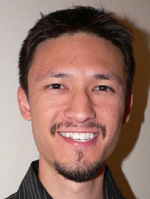 |
Brian Collins wins
Dissertation Completion
Fellowship
15 April 2008
Brian
Collins has
been awarded a Dissertation Completion Fellowship by the Graduate
School, based upon the quality of the research he is conducting and the
progress he has made toward completion of his degree. For
more
information see the Physics Department news
release.
Congratulations! |
|
|
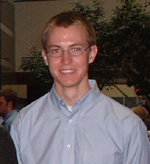 |
Alex Mellnik inducted
to Phi Beta Kappa
31 March 2008
Junior Alex Mellnik has been inducted in to the Phi Beta
Kappa honor society. Only juniors and seniors who have at least a 3.85
grade point average are eligible for membership. Nationally less than
1% of college seniors are invited to join. |
|
|
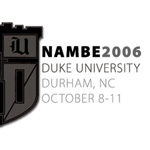
|
Brian
Collins wins
award at NAMBE conference
25 September 2007
Graduate student Brian Collins has been selected as the
Outstanding Student Paper Award winner for the best poster presentation
at
the 24th North American Conference on Molecular Beam Epitaxy (NAMBE).
His
paper was entitled "Effects of complementary doping on structure and
magnetism of Co and Mn co-doped Ge magnetic semiconductor epitaxial
films". The
award includes a plaque and a check of $500 presented at this year's
conference banquet on September 25 in Albuquerque, New Mexico.
For more information see the official
flyer. |
|
|
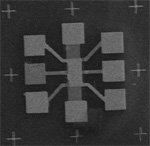
|
Alex Mellnik wins
Kauffman Foundation
Summer Fellowship
23 May 2007
Alex Mellnik
was awarded
a Kauffman Summer Undergraduate Research Fellowship for the
summer
of 2007 for his project entitled "Development and Fabrication of Novel
Magnetic Memory devices." This program is supported by the
Office
of Undergraduate Research and the Ewing Marion Kauffman Foundation.
For more information see the Carolina Entrepreneurial
Initiative web
site. |
|
|
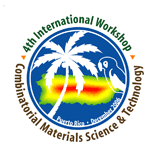
|
Combinatorial
Materials Science and
Technology Meeting
4-6 December 2006
The 4th International Workshop on Combinatorial Materials
Science
and Technology was held at the Caribe Hilton Hotel, San Juan, Puerto
Rico, December 4-6th, 2006. The Proceedings were published
November 2007 as a special issue of Applied Surface
Science. For more information see the website. |
|
|
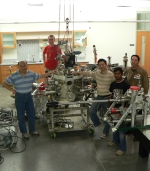
|
MBE Lab has
been moved to Chapman
1 November 2006
Previously located in 128 Phillips Hall, the Tsui Lab has recently been
moved to the basement of the newly constructed Chapman Hall. This
facility provides for a larger and more open floor space, vastly higher
ceiling clearance, and much lower vibrational and electronic noise
levels.
|
| News
Archive |